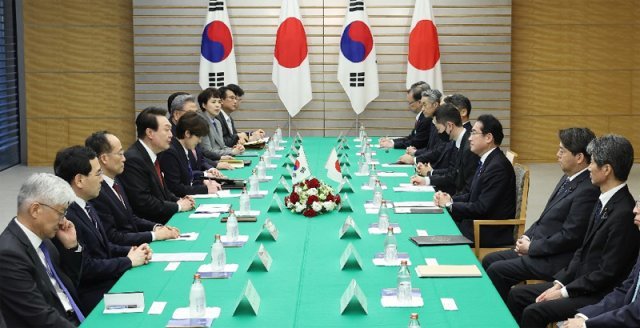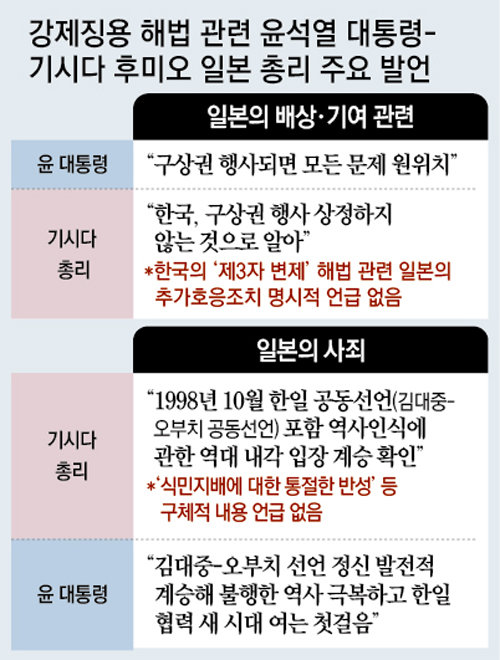[한일 정상회담] Visit to Japan, summit meeting with Kishida
Kishida “Including the 1998 Korea-Japan Joint Declaration, Continuation of Previous Cabinet Positions on Historical Awareness”
Instead of a direct apology, mention of the ‘DJ-Obuchi Declaration’…尹 “The first step to open a new era of Korea-Japan cooperation”
Japanese Prime Minister Fumio Kishida held a joint press conference with President Yoon Seok-yeol, who was visiting Japan on the 16th, right after the Korea-Japan summit meeting. I confirmed that I was doing it,” he said. Instead of directly expressing an apology to the victims of forced labor during the Japanese colonial era in front of President Yoon, he mentioned the succession of the ‘Kim Dae-jung-Obuchi Declaration’, which stipulates remorse and apology for colonial rule. Prime Minister Kishida avoided an immediate answer when asked about Japan’s plans for additional responses to South Korea’s ‘third-party reimbursement proposal’ solution, saying, “We want to produce concrete results one by one in the future.” President Yoon said, “This meeting was the first step toward overcoming the unfortunate history between the two countries and opening a new era of cooperation between Korea and Japan by progressively inheriting the spirit of the Kim Dae-jung-Obuchi Joint Declaration.”
President Yoon, who visited Tokyo for 2 days and 1 night, held a summit meeting with Prime Minister Kishida at the Prime Minister’s official residence for about 1 hour and 23 minutes. A South Korean president’s visit to Japan for bilateral talks is the first in 12 years and the first time in 10 months since President Yoon’s inauguration. At a press conference, Prime Minister Kishida nailed it, saying, “Considering the purpose of this measure, I understand that the Korean government is not considering exercising its right to indemnity (against the Japanese defendant companies).” President Yoon reaffirmed, “If the right to indemnify is exercised, it will put all issues (discussions on forced labor) back to their original place, so the Korean government is not considering it.”
A Japanese government official said at a Japanese press briefing, “Prime Minister Kishida demanded the steady implementation of the 2015 agreement on comfort women between Korea and Japan.” The official said that the Dokdo issue was also discussed at the summit.
“At the meeting, we declared the complete normalization of the General Security of Military Information Agreement (GSOMIA) between South Korea and Japan,” said President Yoon. The two heads of state agreed to promptly restore economic and diplomatic consultative bodies between the authorities, including the Korea-Japan security dialogue and the loan strategy dialogue. Shuttle diplomacy between the leaders was also decided to resume, and Prime Minister Kishida decided to visit Korea at an appropriate time. President Yoon also emphasized, “Korea’s national interest is not a zero-sum relationship with Japan’s national interest,” and “I think it is a win-win national interest.”
Economic cooperation between the two countries was also resumed. As a result of the ‘9th Korea-Japan Export Management Policy Dialogue’ on the 16th, the Ministry of Trade, Industry and Energy lifted Japan’s export restrictions related to hydrogen fluoride, fluorinated polyimide and photoresist. The South Korean government has also decided to drop its World Trade Organization (WTO) complaint against Japan’s export restrictions.
Japan makes a ‘direct apology’ without a direct apology for conscription
Kishida, in response to the response to the Korean Resolution Act
“Some achievements today” avoid immediate reply
Office of the President “The Japanese government has apologized 50 times”
Kishida reveals “visit to Korea at appropriate time”
 Korea-Japan expanded summit in Japan after 12 years President Yoon Seok-yeol and Japanese Prime Minister Fumio Kishida hold an expanded Korea-Japan summit at the Prime Minister’s Office in Tokyo on the 16th, attended by ministers from both countries. It is the first time in 12 years since 2011 that a Korea-Japan summit has been held in Japan. Tokyo = Newsis
Korea-Japan expanded summit in Japan after 12 years President Yoon Seok-yeol and Japanese Prime Minister Fumio Kishida hold an expanded Korea-Japan summit at the Prime Minister’s Office in Tokyo on the 16th, attended by ministers from both countries. It is the first time in 12 years since 2011 that a Korea-Japan summit has been held in Japan. Tokyo = NewsisIn a joint press conference after the Korea-Japan summit on the 16th, President Yoon Seok-yeol said in regards to the issue of compensation for victims of forced labor during the Japanese occupation, “If the right to indemnity (to the Japanese defendant company) is exercised, this will put all the problems back to their original place.” Japanese Prime Minister Fumio Kishida also said, “I understand that the Korean government does not assume the exercise of the right to indemnity.” The leaders of Korea and Japan made it clear that the Korean government-affiliated foundation did not claim the right to indemnity from the Japanese defendants (Mitsubishi Heavy Industries and Nippon Steel) after paying compensation to the victims.
Unlike this, there was no direct apology from Prime Minister Kishida to the victims of forced labor. Prime Minister Kishida also did not comment on the contributions of the Japanese defendant companies. Contrary to the government’s expectation that “more than half of the water cups are full, and more will be filled according to Japan’s response” when the forced labor solution was announced 10 days ago, Prime Minister Kishida did not show any positive response at the Korea-Japan summit that day.

Prime Minister Kishida only said that day, “I confirmed that the position of the previous cabinets on historical awareness, including the Japan-Korea Joint Declaration (Kim Dae-jung-Obuchi Joint Declaration) announced in October 1998, was inherited as a whole.” After the announcement of the solution by the Korean government on the 6th, it was a repeat of the detour position announced. It did not mention the ‘sore remorse for colonial rule and apology from the heart’ specified in the Kim Dae-jung-Obuchi Declaration. In response to a Korean reporter’s question, “There is a lot of public opinion in Korea that Japan’s response is lacking compared to Korea’s efforts,” he said, “I think there have been some concrete results today.” It only said, “There was no specific mention of contributions to the defendant company.
On the other hand, President Yoon repeatedly put a period, saying, “The exercise of the right to indemnity (‘third party reimbursement’ method) is not assumed in relation to the announcement of the solution and its purpose.” “This year marks the 25th anniversary of the Kim Dae-jung-Obuchi Declaration,” he added.
Regarding Prime Minister Kishida’s lack of direct apology, a high-ranking official in the presidential office replied, “In the past, Japanese governments have apologized more than 50 times, including the emperor and prime minister.” He continued, “Didn’t Prime Minister Kishida and Foreign Minister Hayashi Yoshimasa say that they inherit the discourse on historical perception in the past? There is a meaning of an apology in that,” he said. “I think we need to think about what it means to us to receive that apology once more.”
Regarding the statement by a Japanese government official that “Prime Minister Kishida asked President Yoon at the meeting to steadily implement the agreement on comfort women for the Japanese military,” the President’s office said, “Today, we are mainly focusing on the issue of forced labor and ways to develop future-oriented Korea-Japan relations. I was focused on ”he replied only. Prime Minister Kishida served as foreign minister at the time of the comfort women agreement between Korea and Japan in 2015.
The leaders of Korea and Japan also agreed to restore shuttle diplomacy. Prime Minister Kishida said, “The leaders of Korea and Japan agreed to resume shuttle diplomacy without being bound by formalities,” and President Yoon responded by saying, “We actively welcome shuttle diplomacy.” However, when asked about the timing of his visit to Korea, Prime Minister Kishida replied that “nothing has been decided about a specific time.”
Regarding the decision to revitalize economic and cultural exchanges between the two countries that day, President Yoon said, “Korea’s national interest is not a zero-sum relationship with Japan’s national interest. If exchanges become more vigorous, I think the benefits that both countries can gain together are very great,” he said.
However, the victims of forced labor expressed regret over the outcome of the summit. A bereaved family member of a victim of forced labor said in a phone call that day, “I hoped Japan would say something similar to an apology, but it is regrettable that there was no such expression of apology.” However, he also said, “It is said that exchanges between Korea and Japan have resumed, so I expect that there will be an apology or concrete measures in the future, starting with this.”
Park Chul-hee, a professor at Seoul National University Graduate School of International Studies, said, “I think it is a meaningful statement because it is an abstract thing now that we will solve the response in detail in the future.”
Tokyo =
Tokyo =
Source: Donga
Mark Jones is a world traveler and journalist for News Rebeat. With a curious mind and a love of adventure, Mark brings a unique perspective to the latest global events and provides in-depth and thought-provoking coverage of the world at large.